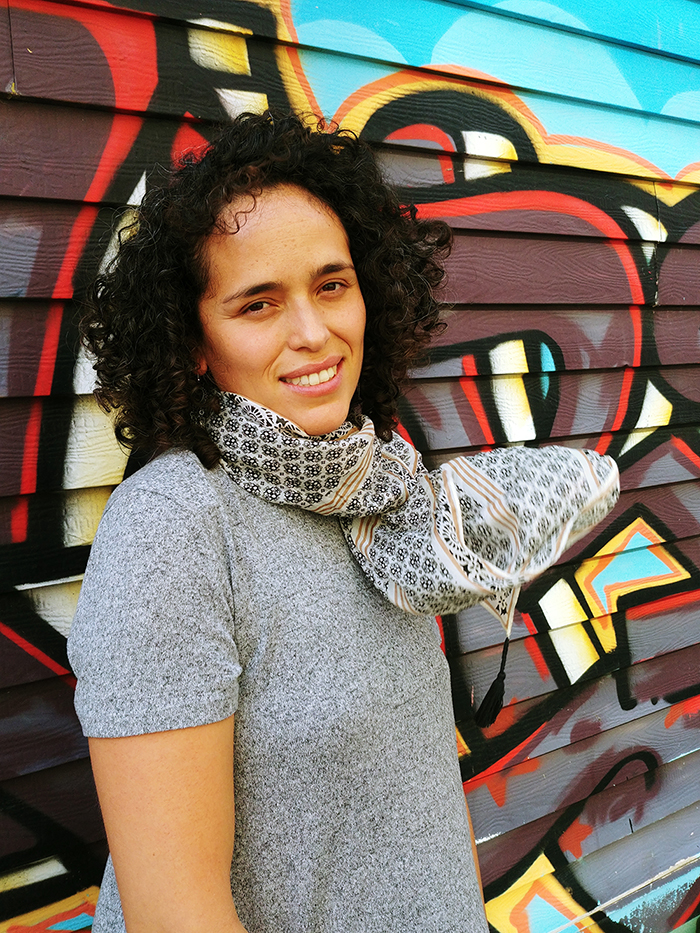Diana Carolina Alvarado, Freelance Interpreter at the Barbra Schlifer Clinic

September 30th is International Translation Day. Adopted by the United Nations General Assembly on May 24, 2017, the day recognizes the role of language professionals in connecting nations and fostering peace, understanding and development.
Translators and interpreters play an important role in bringing nations together, facilitating dialogue, understanding and cooperation among individuals and states. International Translation Day is an important day for the Barbra Schlifer Clinic whose capacity to reach out to people in need would be limited without the assistance of Interpreter Services Toronto – a social purpose enterprise. We invited Diana Carolina Alvarado, one of our long-standing interpreters, to tell us more about the art of interpretation.
Q: Diana, how long have you been an interpreter for the Clinic?
Diana: I came across the Barbra Schlifer Clinic around the time I was completing my Masters in Social Justice and Equity Studies at Brock University. I was looking for organizations who worked on human rights issues. I felt attracted by the Schlifer Clinic’s mission and thought that becoming an interpreter would be a fitting way of contributing to the organization. I started taking interpretation assignments as a freelancer in 2012 after finishing their Interpreter training program.
Q: International Translation Day pays tribute to the work of language professionals who play an important role in bringing nations together, facilitating dialogue, contributing to the strengthening of world peace and security. Do you see yourself as an advocate and facilitator who helps in bridging differences between cultures and individuals?
Diana: Advocacy is inherent to interpretation. In bridging cultural and language barriers, you ensure that people get equal access to services, their human rights are protected, their needs are met. I love interpreting because I love helping people.
Q: How many languages do you speak? What makes a language beautiful?
Diana: I am originally from Colombia, so I speak Spanish and English. These are my only two, but I can translate for most Hispanic nations. Languages, even different dialects, are so varied, not just in sound and grammar, but in the specific understanding of the world they offer. Each one carries its own sensibility and flavour.
Q: What is the most gratifying aspect of the interpreter’s job?
Diana: It is intensely gratifying to see how through the channel of communication, created by the interpreter, people manage to come together. There is a palpable moment when tensions finally melt, and anger and desperation are replaced by empathy and hope. I love to be able to channel understanding, so to speak. Interpreting also keeps you on your feet, continually learning, and self-actualizing. It teaches you to be present with people, attentive, empathetic, but still impartial and aligned with the ethical principles of the profession. There is a significant need in the world for the kind of connection that respects the feelings and life circumstances of others without judgement or interference.
Q: What are the difficulties of the job?
Diana: My role as an interpreter is to facilitate without the friction of my personal values, biases, and emotional traumas. I have to be there and not be there at the same time. So, the hardest part of the job is keeping your personal boundaries, remaining true to your role rather than get personally involved in an unfolding situation. That is not as easy as it sounds. Often, the clients are people who look at you as a carrier of their culture, someone who can immediately relate to their struggles and suffering. You have to keep reminding them about the professional nature of the relationship, ask them to speak directly to each other, rather than address you. Every time you enter a room, you introduce yourself, regardless of how many times you have seen the client before. Then, you also have to keep yourself, your own emotions in check.
Q: Do you care more about verbatim interpretation or diplomacy? Do you ever have to use discretion when translating?
Diana: First of all, I must repeat exactly what is being said. If people swear, I swear too. It is unethical not to do so. I absolutely cannot smooth things out on behalf of anyone or paraphrase expressions for good manners’ sake. In that sense, verbatim interpretation is my obligation to everyone involved.
On the other hand, there is no such thing as literal interpretation in terms of exact correspondences between words. Interpretation is about the meaning of the words, but also the intention behind those words. It has to include non-verbal communication such as body language, tone, and pace of speech. It is a fine balance of witnessing and understanding without interfering. Your own self-awareness is always key, both for understanding others and for leaving your own emotional noise out of the interpretation.
Q: Tell us a story that stands out for you.
The hardest moment in my interpreting career was a court hearing of a Colombian immigrant who was describing in graphic detail his experiences in the hands of Colombian militant groups. Having lost my own father in similar circumstances, I found it very hard to distance myself emotionally from the content of the discussion. It continued for six hours. I am still not sure how I made it through. The incident forced me to address personal issues I had been avoiding for years. This is precisely why interpreting is a way of relating to others that requires your continuous personal growth.
